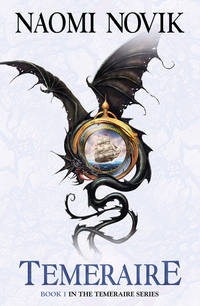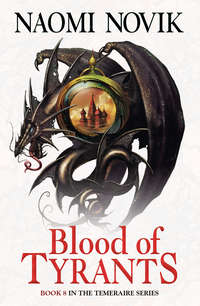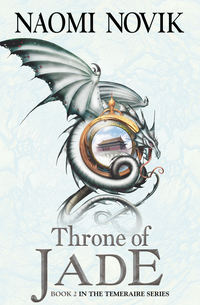
Полная версия
Crucible of Gold
The swell was not high—that was to say, not high for the Southern Ocean; only twenty feet—and the Allegiance rolled and pitched wildly from her crew’s neglect. “Look out there!” Purbeck shouted, from the helm: one of the cannon had burst loose from its tackle, and as the ship heaved majestically over the next crest, the snub-nosed iron monster eased out of her traces and began trundling towards them at deceptive pace, wheels of the gun-carriage a hollow grumble over the deck.
Granby was trying to guide some men towards the reaching dragons: the carpenter and three of his mates, amiable drunks swaying deeply and keeping their feet only with the practiced balance of long-time sailors, arm in arm with one another and hiccoughing with laughter. The cannon slid into them sideways at the waist and knocked them over the barrel: expressions more of surprise than alarm as it swept onward with them.
Laurence had only time to seize Granby by the arm, and be dragged alongside with him by the inexorable weight: a corner of his coat was hooked over and pierced by the broken iron ring that had set the gun-carriage loose. Sliding over the deck behind the gun, Laurence managed to set his boot-heels to the railing and stop himself with a jolt as the gun crashed with ease through the oak. The cannon went over; the carpenters went, too, at the last yelling in fear as they fell. Granby screamed once, a shocked cry wrenched out of him, and his arm came queerly loose in Laurence’s grip.
The fine silk slid through Laurence’s fingers, embroidery snarling upon his rough calluses; the sun was in his eyes and dazzling on the cloth-of-gold. Granby had clenched shut his jaw, but his hand did not grip back, and he was sliding over the edge. Abruptly Ferris was beside them, dropping to his knees with a knife in his hands. He put it to the back of Granby’s coat and thrust it through, ripping up, and the cloth sheared away.
Laurence tumbled backwards with Granby, who gasped only, very pale under his sunburnt color; the arm still hung limp when Laurence and Ferris had set him on his feet.
“Granby, Granby!” Iskierka was shrilling, leaning deeply over the dragondeck railing and reaching for the mainmast to support herself, trying to get to them: in a moment she would have clawed through the rigging.
Ferris called back, “I’ll bring him to you, Iskierka; don’t snatch at him or you’ll jar his arm worse,” so she subsided back in hissing anxiety; Laurence nodded to Ferris, who ducked under Granby’s other arm and helped him across the deck.
There was no sign of the other men over the side; the ocean was beaten into a froth all around the ship. No more jeering came from the rigging. All the ship’s officers and her Marines were now awake and on the deck, Riley calling orders from the stern and his servant Carver hovering behind him with a neckcloth flapping in the wind like a white banner, attempting now and again to dart in and tie it for him, over Riley’s impatient jerked hand.
“Laurence, are you well?” Temeraire was calling, with not much less anxiety than Iskierka. Laurence wiped his streaming eyes. Smoke still seeped up from the creeping fire below, and Riley was sending the more coherent of the men down in groups under an officer, to go at it with buckets and pails; he needed hands now, and badly.
“I am very well,” Laurence said, “and pray take those men in your belly-netting and go dunk them half-a-dozen times in the ocean; we will see if they can be sobered enough for work.”
Then he was suddenly looking at the Allegiance as through a window of old mazed glass, green and rippled, with a sunset behind her: fascinated he watched her growing darker and more distant, red and gold color swallowed up by murk; he felt curiously light and free, like flying but without wind.
His head was dragged abruptly up through the water, the clear sun overhead a painful dazzle in his eyes and salt water choking his mouth; he vomited more onto the waves, and blindly clung where Demane put his hands, on a piece of driftwood—on a piece of deck planking, hot to the touch and still smoking from one corner—
There was no sunset. The Allegiance was shattered open along her stern: from the gundeck to the waterline a gaping mouth full of splinters and flames, and all her sails were ablaze.
“My God,” Laurence said involuntarily; his voice was a raw croak.
“What happened?” Demane said, gasping for breath beside him, also holding fast to the plank as it bobbed in the waves.
A sudden roar and shudder shook the Allegiance again, and another eruption of incandescent fire burst from her side; Laurence pulled Demane’s head down and ducked his own: in a moment a rain of splinters and ash came pattering over them, stinging on the skin.
The cloud passed. “But—” Demane said. “But—” He stopped.
Laurence looked up again. The flames inside the ship were dying as the waters rushed in over the broken planking. She was tipping backwards and up, the great fan-shaped dragondeck rising into the air. The dragons were circling overhead like ravens watching some great beast die, as she began slowly to sink down beneath the waves.
Chapter Four
Temeraire did not precisely understand what had happened, at first—he had been skimming low over the water, soaking the drunken sailors despite their loud protestations, and then suddenly a great roaring and fire everywhere, a hundred times louder than Iskierka might have been. Burning scraps of sailcloth and wood were flung upon him, and when he pulled up into the air to look, he saw the flames rising from the deck.
“Is it a battle?” Kulingile demanded in high excitement, dashing over and dripping water onto Temeraire from the men crammed into his own belly-rigging. “Will we have a prize?”
“Well, I suppose we must have been attacked, but I do not see any other ship at all,” Temeraire had said, deeply confused himself, and winged around the Allegiance, only then seeing the enormous gaping hole into the ship—and so very strange to see her cut open in such a way and look in at all the decks in cross-section, the lumpy white hammocks swinging from the rafters like the drawing he had seen once of silkworms in their cocoons, and the guns sliding out into the ocean with tremendous plashes. Casks and bales were floating everywhere, and the sheep had escaped their pen and were swimming away, bleating: many of them had fire caught in their wool.
“Oh,” Kulingile said with interest.
“I am sure we oughtn’t eat them now,” Temeraire said, “this is not a time to be eating. And where is Laurence?” he added, and looked higher. The deck was littered with rigging and broken yards, the ladderways seething with fire and smoke, and bodies lay limp and strewn carelessly everywhere, bloody. Temeraire did not see Laurence anywhere, or any of his crew, and no-one answered when he called. “Laurence!” he cried again.
He flew around the ship again in perfect distraction—there were men in the water, but it was very hard to make them out, only little heads bobbing very much like casks, and they did not call out to him—why, why had Temeraire ever left the ship without Laurence? He had only meant to be gone a few moments—there had been no enemy in sight—what business did the ship have, bursting open in this way—
He jerked his head as something bright flashed in his eyes, and looking over saw Roland—Roland, waving at him wildly from the edge of the dragondeck. She had out one of his talon-sheaths and was reflecting the sunlight at him off the polished gold; she had been ducked underneath one of the tarpaulins. He stooped and snatched her up at once, and seized little Gerry and Sipho also while he was at it—he ought not have left any of them out of his reach at all, ever.
“Laurence?” he demanded. “Yes, yes, I see you,” he added with impatience, taking up Cavendish, who was waving his arms frantically to be picked off the deck also: a midwingman of sixteen, whom Laurence had taken on for some inconceivable reason; who cared anything for him?
“I don’t see the captain,” Roland said, hooking her carabiners onto his harness, and reaching to help Gerry with his. “Leave off yammering, you damned drunken sots,” she added, to the men clamoring from the belly-netting, as she climbed up past them, “or I will tell Temeraire to cut you all loose, and good riddance.” Temeraire had quite forgotten they were even there. “Do you circle about, Temeraire, and go slowly; we’ll all look, for him and—and for Demane.” Kulingile was already flying in wide anxious rings around the ship, calling for Demane.
Iskierka came winging back to help look—she had Granby, latched on to her back; she had not lost her captain. And she had Ferris also aboard, even though Ferris was Temeraire’s—but Temeraire could not be properly annoyed by that; there was no room in him for anything so small at the moment.
Gerry piped faintly from his back, “I see him! I see Demane, and the captain, too,” and Temeraire plunged at once to snatch them both from the water, with the scrap of wood that seemed quite shockingly, painfully small to have been their only support.
“Give him here!” Kulingile demanded at once, hard on his heels and circling anxiously. “Demane, are you well?”
“He is too chilled to speak,” Laurence said—at least, it seemed he said it; his voice did not sound at all like himself, very hoarse and grating, and he stuttered a little. “You must wait until he has warmed again.”
“I’ve a tarpaulin, sir, if you will wrap up in that,” Roland said, reaching up to help him and Demane step down from Temeraire’s claw onto his shoulders. “And we might get some of our gear off the dragondeck, I expect, before she goes under: most of it was tied down.”
Temeraire at first wondered what Roland meant; then he looked back at the ship. Water was pouring into the open hole, and the Allegiance was sliding slowly and gracefully beneath the surface.
“Oh!” he said, “but how are we to save her?”
“There is no hope of that,” Laurence said, locking himself onto the harness with slow, precise movements; his hands were shaking. “Temeraire, I cannot shout; tell Iskierka and Kulingile to take up whatever survivors they can, and we will go after the supply: only you can hover over the ship.”
Laurence was very urgent they should work quickly, but it did not speed matters at all that most of the sailors, quite stupidly, tried to swim away when Iskierka or Kulingile reached to pick them up out of the water. And they were able to get a few things only off the dragondeck—some harness and another tarpaulin, fetched by Roland hanging down on a strap from Temeraire’s belly, with a hoist rigged up to get the things into his netting.
Gong Su had managed somehow to climb out of the belly of the ship, his boots tied together by their laces slung around his neck, with a thin oilskin pouch. He stood helping a still-drink-addled O’Dea balance on the ship’s figurehead—a woman with flowing robes and also great feathered wings, which Temeraire had never seen before due to its ordinarily being hidden beneath the dragondeck; she presently pointed almost directly into the air.
Gong Su pulled himself up Temeraire’s side, when put onto the harness. “No, sir,” Temeraire heard him say, when Laurence asked him about Fellowes, “I am sorry, but I did not see him; all the lower decks are full of smoke, and there are many men dead.”
“It is only to be expected, sure,” O’Dea said, and hiccoughed. “The judgment of the ocean—”
“Enough,” Laurence said: that was all he said, but O’Dea subsided, abashed, and muffled his further hiccoughs into his hand.
“Should I try for some of those water-casks, sir?” Roland called up.
“Tell her no,” Laurence said to Temeraire, “but you ought to drink whichever of them you can reach, yourself, and let Iskierka and Kulingile do the same; and you had better eat those sheep.”
“Those fellows in the belly-netting will be thirsty very soon,” Temeraire pointed out, “and so will you, Laurence.”
“Let Roland light along a couple of canteens, and as for those bastards, they may go hang,” Laurence said, and it was not only his altered voice which made him sound grim. “You must travel as light as may be, my dear: we will want land sooner than water.”
An hour passed, dragging up supplies and a few more survivors from the ship, and then Iskierka was winging by. “We aren’t pulling anyone else up,” Granby called over wearily; his arm and his shoulder were bound up tightly against his body. “Not alive, anyway: the water is too cold. We had better go.”
“Set your course northeast,” Laurence said, “and keep as far apart from the others as you can and still be in sight of one another, so we may best watch for land; make sure Iskierka and Kulingile have lanterns for the night.”
It was very strange and lonely to fly away from the remains of the Allegiance for good, out across the open ocean with no destination. She was nearly all beneath the water now and sinking more rapidly; only the dragondeck yet jutted out into the sky. The ship’s boats were pulling away, crammed with sailors. They could not keep in company with them, of course; there had only been a brief shouting back and forth. Lieutenant Burrough was in command of the launch, and Lieutenant Paris, a boy of fifteen, in charge of the one cutter which had survived, with Midshipman Darcy to assist him.
“You do not see Riley anywhere, do you?” Laurence asked quietly, after they had spoken with the boats.
“No—” Temeraire said, after a moment. Riley had fed him that enormous red-fleshed tunny, three days after his hatching. Temeraire had never been quite so hungry ever in his life as those first few days, and Laurence had been asleep at the time—Riley had come down to the cabin with the fish himself because most of the sailors were too afraid—
“No,” Temeraire said. “No, Laurence, I do not see him.”
Laurence said nothing; when Temeraire glanced back, his face was set and grim, his eyes looking over the smoking wreckage distant; he only nodded, and turned to ask Mrs. Pemberton, “Ma’am, would you prefer to go in the boats?” She had been retrieved along with Mr. Hammond from the bow cabins: they had pushed out a window and waved her spare petticoat to attract notice, and been pulled up by a rope. “We can lower you down to them, and take off one or two of the men, if they are crowded.”
“Thank you, sir; I should rather stay aboard,” she said.
“You must realize,” Laurence said, “dragons can stay aloft at most two days—perhaps three—”
“As I understand it, there is very little chance of a boat making landfall, either, from these latitudes,” she said. “If it were done, t’were well it were done quickly, I think.”
“Of course you are much better remaining with me than going in one of those boats,” Temeraire said, swallowing a last morsel of raw mutton. After all, Lung Shen Li flew all the long way from China to the coast of Australia, scarcely landing along the way. Laurence might be pessimistic, but Temeraire was quite certain he was not going to sink in an ignominious fashion, without even a battle for excuse; he would certainly not drop before they found land.
“I still think we ought to pull her up,” Iskierka grumbled, circling the tip of the Allegiance once more: all her prize-goods had been in the hold, and Granby’s coat was entirely spoilt. That did not cheer Temeraire precisely, because one could not be happy that anything so very nice was ruined, or going to the bottom of the ocean for no-one but sea-serpents to enjoy, but it was something that Iskierka could not show away anymore, and meanwhile Laurence’s own formal robes were safely aboard in their oilskin bag, with Temeraire’s talon-sheaths for company; he could congratulate himself on having detailed Roland to keep them safe, and on the deck.
“We have already tried, when she did not have so much water in her, so there is no sense in imagining we will do any better a second time,” Temeraire said. “We had much better go.”
He put the sun behind him and flew.
Laurence looked around only once while the Allegiance dwindled away behind them, wreckage and flotsam spreading wide around her like the skirts of a court dress; the sharks were already busy in the water. It was a sorry, bitter end for so many good men: the worst saved and even now making moan in Temeraire’s belly-netting, the best sent down to a silent grave trying to repair their folly, without even hope of glory for reward. Riley would be remembered as the man who had lost a transport on a cloudless day; if any of them lived to carry the report back to the Admiralty.
The weak sun, shrunken down and pale this far south, did little to warm skin and clothes waterlogged with salt, but Laurence was sorry to see it sinking, and still more sorry that the dragons had spent so much of the morning aloft in hunting and play.
They spread out as they flew; by dusk, Kulingile and Iskierka were specks to either side like distant sea-birds, growing faint to see as night fell: then there was only the small struggling glow of the lanterns keeping pace with them through the dark. They made not much noise besides the complaining from below, and even that died over time. The wind cut sharp and icy through the oilskins and tarpaulins on their backs, whistling, and the ocean muttered in low voices, patient.
“I am sorry we did not bring along some of the sheep with us,” Temeraire said, yawning tremendously into the wind as the sun came up after only a brief night. “I would not mind another one now; it cannot be convenient to fish when I have so many people dangling off me.”
He put his head down and flew onward. Laurence could not help but think how much lighter Temeraire would go without the men crammed into his belly-netting; it might mean as much as another day aloft. A thought rooted in darker sentiment, in angry resentment: They have killed us.
There were a few rocky atolls scattered across the Pacific at these latitudes; the chances of finding them with neither map nor compass were not to be counted, and if found, little hope of finding another within flying distance from there. These waters were not so hospitable they would sustain three large dragons for long, fishing in the same narrow space.
There was some better chance they would find instead a ship, which might be spied at even great distance by her lights—some lonely whaler plying her lines, or a clipper making for Cape Horn. But such a ship would offer no refuge for any of the dragons; they could only let off their burden, then drown having spent their last strength to rescue the men responsible for the disaster, who deserved better to end their journey at the end of a rope.
Laurence wrote a report as they flew, ten minutes at a time before he had to pause and warm his hands again, tucked inside his coat beneath the tarpaulin. If they did find any such refuge, the Admiralty should at least receive a full accounting, and know Riley had been neither a fool nor an incompetent.
He was betrayed, rather, by the Folly of foolish men, and the Evil of Liquor: when he and his Officers, who had put forth every most heroic effort and preserved the Ship throughout a Gale of terrific force and danger, over the course of five Days and Nights, were overcome for a little while by Fatigue; a great many of the less-skilled Hands, who were used more gently during the Crisis, in Shifts, than the Officers used themselves, seized upon this Opportunity to bring Ruin on all alike in their mad greed for spirits.
Конец ознакомительного фрагмента.
Текст предоставлен ООО «ЛитРес».
Прочитайте эту книгу целиком, купив полную легальную версию на ЛитРес.
Безопасно оплатить книгу можно банковской картой Visa, MasterCard, Maestro, со счета мобильного телефона, с платежного терминала, в салоне МТС или Связной, через PayPal, WebMoney, Яндекс.Деньги, QIWI Кошелек, бонусными картами или другим удобным Вам способом.






